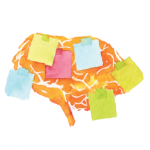 Many parts of the brain are responsible for memory. And, like most bodily functions, memory naturally declines as we age.1 Genetics also impact memory, especially if there is a predisposition to neurogenerative conditions, such as Alzheimer’s disease. Other factors, including brain injury, stress, illness, and unhealthy dietary choices (e.g., foods that are high in saturated fat and/or refined carbohydrates), can hinder the brain’s ability to memorize and learn.1 Fortunately, the brain is always forming new neural pathways and has the ability to adapt and change. Keep in mind, memory depends on the overall health of the brain.1 A varied diet that includes a balance of fresh fruits, vegetables, whole grains, legumes, and nuts will help keep your brain healthy, but there are particular nutrients that have been shown to enhance brain function and health, which keeps your memory sharp and vital.
Many parts of the brain are responsible for memory. And, like most bodily functions, memory naturally declines as we age.1 Genetics also impact memory, especially if there is a predisposition to neurogenerative conditions, such as Alzheimer’s disease. Other factors, including brain injury, stress, illness, and unhealthy dietary choices (e.g., foods that are high in saturated fat and/or refined carbohydrates), can hinder the brain’s ability to memorize and learn.1 Fortunately, the brain is always forming new neural pathways and has the ability to adapt and change. Keep in mind, memory depends on the overall health of the brain.1 A varied diet that includes a balance of fresh fruits, vegetables, whole grains, legumes, and nuts will help keep your brain healthy, but there are particular nutrients that have been shown to enhance brain function and health, which keeps your memory sharp and vital.
ANTHOCYANINS are flavonoids with compounds that have anti- inflammatory and antioxidizing properties that work to repair tissue damage, control immune responses, and control excessive oxidative stress. These flavonoids give fruits and leafy vegetables their red, purple, and blue pigments in their flowers, fruits, stems, and leaves. Berries, purple and red grapes, purple cabbage, red radishes, tomatoes, plums, and any leafy vegetables, grains,or fruits with red, purple, or blue pigments, are the best sources of anthocyanins.2 A daily intake of a handful of berries has been shown to slow cognitive aging by up to two and 3 a half years. Blueberries also contain antioxidants that enhance communication between brain cells.3
CURCUMIN. This compound that gives turmeric its orange-yellow pigment has the ability to cross the brain-blood barrier and directly impact brain cells.5 According to researchers at UCLA, curcumin has been shown to improve memory in individuals with age-related memory loss.5 They also found curcumin impacted the microscopic plaques and tangles in the brains of people with Alzheimer’s, dementia, and other neurodegenerative disease.5 Moreover, curcumin can delay degeneration
of neurons and serves as an anti-inflammatory and antioxidant. Aim for a teaspoon or two of turmeric per day, either directly ingested via a capsule or added to meals.
MAGNESIUM. This mineral can combat the memory lapses that come with aging.6 Increasing magnesium intake has been shown to enhance the brain’s ability to memorize information and learn. Apparently, only 32 percent of the population meets the daily recommended amount of magnesium.6-8 Fortunately, the mineral is really easy to come by, as it’s found in almonds, spinach, cashews, peanuts, soymilk, black and kidney beans, brown rice, oatmeal, edamame, potatoes, bananas, and avocados.6
Habits that Can Improve Memory[13]
Play Brain Games. Doing Sudoku, crossword, and puzzles alike every day can sharpen memory and enhance concentration.
Eat the Right Foods. Aim to include the foods we’ve listed here!
Learn a New Skill. Whether it be a new language, sewing, or skiing, diligent learning can improve the ability to remember new information as it’s presented.
Sleep More. Not getting enough sleep can deteriorate memories. Sleeping eight hours or more allows the brain to transfer memories to long-term storage.
Engage in Physical Activity. Moving the body boosts the production of norepinephrine, a chemical that positively impacts memory and increases the size of your brain, allowing more room for information (and memories!).
SOURCES
- Baddeley A. Working Memory and Education, first edition. Cambridge, Massachusetts: Academic Press;2006:1–31
- Cassidy A, Rogers G, Peterson JJ, et al. Higher dietary anthocyanin and flavonol intakes are associated with anti-inflammatory effects in a population of US adults. Am J Clin Nutr. 2015 Jul;102(1):172–181.
- Devore EE, Kang JH, Breteler MM, and Grodstein F. Dietary intakes of berries and flavonoids in relation to cognitive decline. Ann Neurol. 2012 Jul;72(1):135-43.
- Mishra S, Palanivelu K. The effect of curcumin (turmeric) on Alzheimer’s disease: An overview. Ann Indian Acad Neurol. 2008;11(1):13–19.
- Hopper L. Curcumin improves memory and mood, new UCLA study says. 22 JAN 2018. UCLA Newsroom site. https://newsroom.ucla.edu/releases/curcumin-improves-memory-and-mood-new-ucla-study-says. Accessed 30 JUL 2020.
- National Institutes of Health: Office of Dietary Supplements site. Magnesium. Updated 24 MAR 2020. https://ods. od.nih.gov/factsheets/Magnesium-HealthProfessional/. Accessed 30 JUL 2020.
- Broder J. Magnesium May Improve Memory. 27 JAN 2010. WebMD News site. https://www.webmd.com/brain/ news/20100127/magnesium-may-improve-memory. Accessed 30 JUL 2020.
- Hoane MR. The role of magnesium therapy in learning and memory. In: Vink R, Nechifor M. Adelaide (AU): University of Adelaide Press; 2011.
- Chouet J, Ferland G, Féart C, et al. Dietary Vitamin K Intake Is Associated with Cognition and Behaviour among Geriatric Patients: The CLIP Study. Nutrients. 2015;7(8):6739–6750.
- Alisi L, Cao R, De Angelis C, et al. The Relationships Between Vitamin K and Cognition: A Review of Current Evidence. Front Neurol. 2019;10:239.
- Alisi L, Cao R, De Angelis C, et al. The Relationships Between Vitamin K and Cognition: A Review of Current Evidence. Front Neurol. 2019;10:239.
- Reynolds EH. Folic acid, ageing, depression, and dementia. BMJ. 2002;324(7352):1512–1515
- Time site. 7 Tricks to Improve Memory. 8 APR 2014. https://time.com/52237/7-tricks-to-improve-your- memory/. Accessed 30 JUL 2020.





